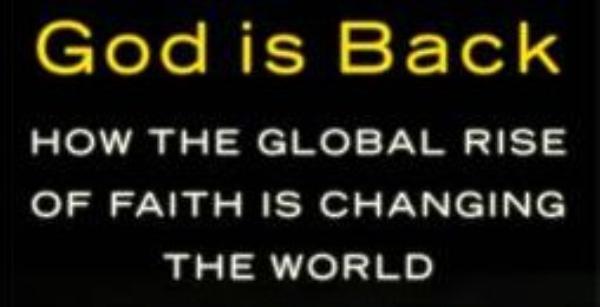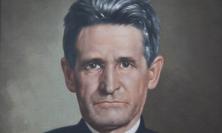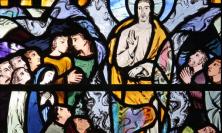Five years before Richard Dawkins published his 1996 potboiler The God Delusion, and just before 11 September 2001, a cluster of American theologians including Eduardo Mendieta published a set of essays, Religions/Globalisations: Theories and Cases, in which they argued that:
For the majority of cultures around the world, religion thoroughly permeates and decisively affects the everyday rituals of survival and hope. Reflected in diverse spiritual customs, sacred symbols and indigenous worship styles, global religions are permanent constituents of human life. In fact, for most of the world’s peoples religion helps to construct the public realm. The norm therefore, is not a false divide between secularity and spirituality but the co-existence and interweaving of the so-called holy and profane.
God is Back: How the Global Rise of Faith is Changing The World, written by two American journalists working for The Economist, John Micklethwait and Adrian Wooldridge (one Catholic and one atheist, respectively), seeks to amplify this counter-cultural account from within a American perspective. The declamatory title could be off-putting, as this book is not another rebuttal of Dawkins and Hitchens in defence of religion against versions of Darwinism; rather it is a carefully detailed and researched narrative of the history of the development of faith in America and the global consequences of this up to the present day. Micklethwait and Wooldridge develop a powerful narrative, casting aside the claims made from the time of sociologist C. Wright Mills (1959) onward, that modernity and secularisation would sweep through civilisations, loosening the grip of the sacred and effectively banishing religious belief to ‘the private realm’.
God is Back is a well-written American history book focussing on the difference between religious development in America and Europe. They authors point out, using early sources, that religion and modernity were never sworn enemies in America, as they were in Europe. Nor was the American Revolution anti-religious, as was the French Revolution. America, in contrast, embraced religion alongside liberty, reason and popular government, but insisted that it be a matter of ‘individual conscience’ rather than institutionalised ‘state craft’.
It’s not just that ‘from the suburbs of Dallas to the slums of Sao Paulo, to the back streets of Bradford you can see religion returning to public life’, with the numbers of Christians, Muslims, Buddhists and Hindus rising from 67% of the world’s population in 1900, to 73% in 2005 and a predicted 80% by 2050; the main thesis of God is Back is that religion and modernity are actually thriving together. Micklethwait and Wooldridge argue that ‘the very things supposed to destroy religion – democracy and markets, technology and reason – are combining to make it stronger’. Their historical surveys of religion in China, the rise of Pentecostalism in Korea, and the world of Islam are bristling with statistics (there are now 65 million Protestants, 12 million Catholics and 20 million Muslims in China) and this worldwide expansion, they suggest, is driven by the American religious model, characterised by an emphasis on individual conscience and choice which leads to a pluralism of all religious beliefs as ‘competitors in the marketplace’. In America itself, the Yearbook of American Churches for 2005 listed 217 different church traditions, with over 225 million church members. From the spread of Methodism in the 1780s and the rise of the Baptists in the eighteenth and nineteenth century, through the rise of the Pentecostalists in the twentieth, Micklethwait and Wooldridge demonstrate that in America: ‘modernity and religion are not incompatible: religion has always thrived in the world’s most modern country.’ Moreover religion is moving back to the centre of intellectual life, with over 200 think tanks looking at ‘Religion and Society in America’.
In the culture of European secularism, unlike in America, they note that there are more than just market forces at work: ‘One factor is deep-rooted cultural hostility, irrigated by ridicule and contempt’ (p 136). In America, religious identities are ‘becoming something that people craft rather than take for granted’. Moreover the growth of the ‘mega-churches’ (Southern Baptist and Pentecostal) in the suburbs show that ‘faith has become a useful attribute for prosperous people’. This dynamic growth in America, the authors say, substitutes for the lack of a European (especially British) -style welfare state; ‘religion offers a helping hand’.
The core message of God is Back, therefore, is ‘look around the world and the exception is plainly not today’s America but post-war Europe,’ as ‘Europe is more likely to move in America’s direction than America in Europe’s.’ Exporting ‘America’s God’ to South Korea, Brazil, China and Africa demonstrates that ‘America is winning because the American model of religion, based on choice rather than state fiat, succeeded in putting God back into modernity by putting modernity, at least choice and competition, back into God.’
This modern historical narrative (which includes an excellent account of modern Islam) presents American ‘free choice pluralism’ as the worldwide religious model. But as this model often implies that spiritual wealth and material wealth go together (summed up in sermons on ‘whether Jesus would wear a Rolex’) we are still left with a major question: where are the poor? But Micklethwait and Wooldridge’s eminently readable account is not a work of progressive and radical political theology; it gives a helpful historical background.
The reviewer, John Battle, is Member of Parliament for Leeds West.






